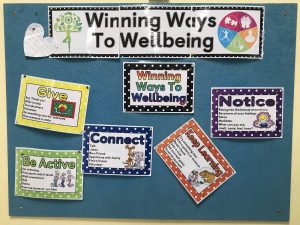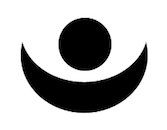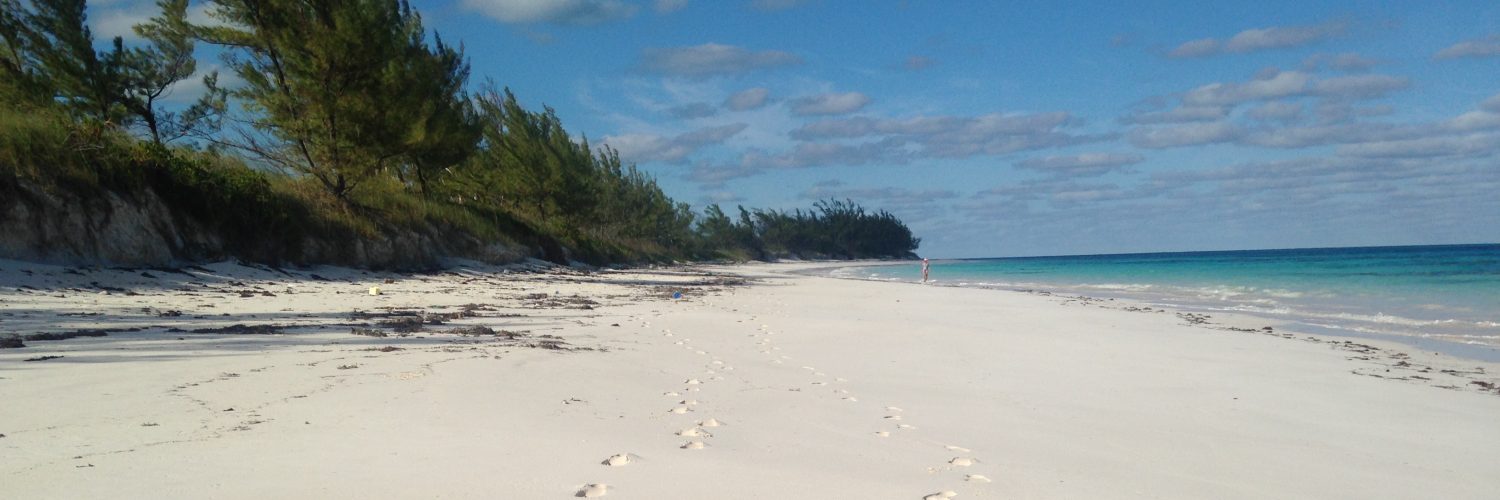“Everything in life is vibration” – Albert Einstein
All things vibrate energetically due to their atomic or molecular structure. When we talk about our own vibration, we mean our overall state of being; relative to all that we interact with. It’s important that we recognise our own vibration and how that can be affected by all that we come into contact with – not just other people, but food, technology, weather, scent, buildings…it all matters to our vibration.
But why is vibration important?
Because we need to find balance to find wellness and wholeness. It sounds simple and yet in modern life it is so hard to find that balance and more so to keep it. Ancient cultures understood vibration and the importance of balancing energy to bring wellness to the individual and the community. Energetic balance is central to Shamanic principles of wellbeing, just as it is central to yogic philosophy, Traditional Chinese Medicine, aromatherapy, sound therapy…the list goes on.
Our ancestors knew that the individual could not find balance alone. But, as we move away from small community living to global society, what we actually find is we are billions of individuals that have lost a lot of our real and meaningful connection to each other. Competition and selfishness have caused us a great deal of physical and mental suffering.
If we recognise that balance is found in the principle of interconnectedness; that all things affect us just as we affect them; then we can regain our balance.
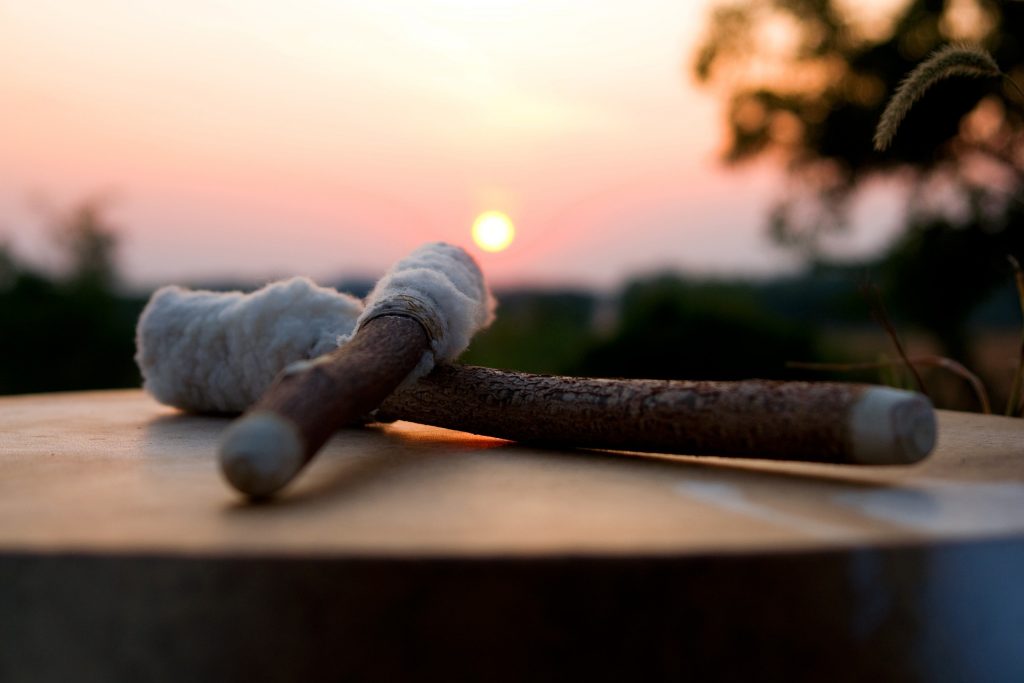
How do I know if I’m out of balance?
There are a number of signs that you may be feeling out of balance energetically:
- Feeling stuck and not sure of which decisions or directions to take in life
- Feeling of carrying a weight that often manifests as sadness or dissatisfaction
- Loss of motivation, even for the things that you enjoyed previously
- Stress and anxiety and feelings of overwhelm
- Periods of illness or inability to shake off illness
- Mood swings
- The ease and joy of life feel difficult to find
- Fatigue or lethargy
- Digestive discomfort
How can I find my Balance?
All things are connected, so all things affect your energetic balance. An upset in the balance of your energy can have great physical and mental effects, but sound therapy can help you to find the balance that has been lost by directing sound frequencies into the body and mind.
Sound Therapy
A profound way to access and heal energetic balance is through sound therapy. As you relax, traditional instruments that have been used for healing practices for centuries, are played on or near to your body. The frequencies of the sounds produced, effect and realign the frequencies and energetic balance of our bodies and minds.
The pure sounds enter the body and mind and can have a profound effect on emotional states, mental busyness and stress levels. Sound therapy can also treat physical ailments as the sound frequencies enter the body and resonate with water and fluid content in the cells. Rhythmic and repetitive sounds can also directly affect brainwave states to bring individuals into deeper states of relaxation, awareness and consciousness. The deeper states of relaxation activate the parasympathetic nervous system, turning down the body’s stress response and activating the release of hormones to bring the body back to balance chemically as well a energetically. Long-term or chronic illness such a fibromyalgia, chronic fatigue and osteoarthritis can also be alleviated through sound therapy as sound waves enter the body and encourage healing on a cellular level.
Sound therapy also has deep connection to Chakra theory. Each Chakra (energetic wheel) vibrates at a certain frequency and can be assisted back into balance and free movement through the use of sound therapy. Particular frequencies played on or near to the Chakras can have a profound rebalancing effect on overall wellbeing.
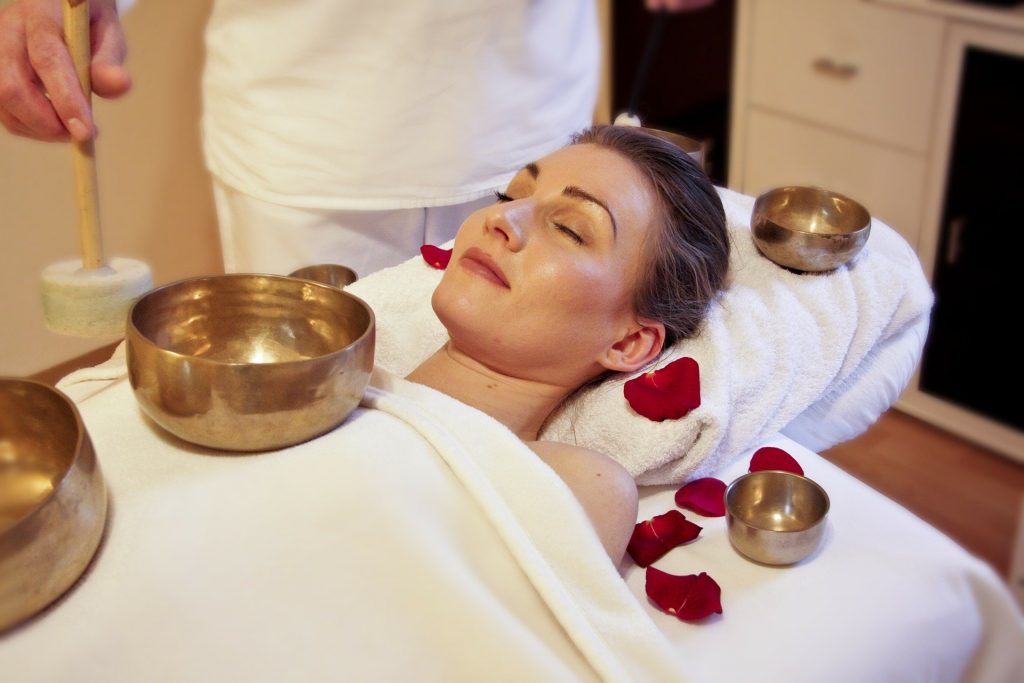
What’s involved in a therapy session?
Therapy sessions utilise tonal (singing bowls, bells, chimes etc) and rhythmic (drums, rattles etc) instruments as part of the therapeutic process. There may also be use of vocal toning and mantra to aid the process of relaxation and to create further resonant tones.
So many of our modern illness and imbalances are caused by stress and we often find ourselves tolerating the effects of stress for far longer than we should. Thinking, ‘things will get better’, ‘this will pass soon’, but often we struggle on for years.
Sound therapy isn’t just about listening to nice music and relaxing for an hour (although that does happen). Techniques of visualisation, reflection and grounding are built into the practice and afterwards to allow each client to gain a deeper insight into their own wellbeing and how practical steps to rebalance can be take in everyday life.
Following an initial consultation, you will relax on a therapy couch or on the floor (supported by blankets and pillows) and will be guided into relaxation before the therapy session begins. Based on your individual requirements and concerns, the therapist will play instruments directed at particular health concerns, imbalances or reactions that have manifested in the body or mind. Following the treatment you will be brought slowly out of the session with grounding techniques and self-reflection on your journey or experience during the treatment and in the following weeks.
How to book
Sessions are available throughout the week at The Well Nest Studio, very close to Stafford town centre. Please contact Hannah to check availability and make your booking. [email protected]
The first session you have will last 75 minutes to allow for the initial consultation and discussion of your requirements. Sessions can thereafter be booked for 60 or 45 minutes.
First session (75 minutes) £45
60 minute session £40
45 minute session £35
Small group sessions can also be provided at The Well Nest or at your home. please contact Hannah to make enquiries [email protected]
Shamanism for Modern Life
Modern life is difficult – we all know this! Sometimes it’s hard to find exactly why it appears to be such a struggle – are we doing it wrong? Are other people finding it much more easy to navigate the challenges of modern life than we are?
The answer to both of these questions is largely no. Life is an art not a science – we aren’t doing it wrong and others aren’t having more success at it than we are (although social media and the art of ‘appearing happy’ would have us believe otherwise).
But…we do know that there are a lot of things we could do to help ourselves. Exercise, meditation, relaxation, therapy…all these things can help us sort through the difficulties of life and find more ease. Shamanism can help us find balance and ease with life too.
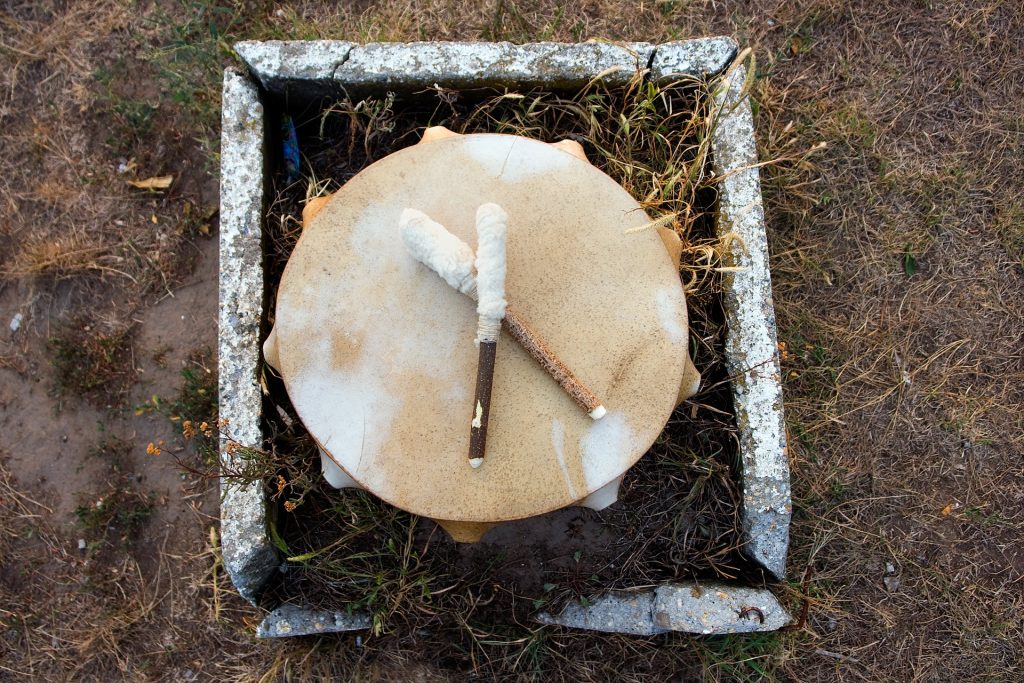
What is Shamanism?
Shamanism is one of the oldest systems of finding balance, harmony and wholeness that humans across the globe have relied upon for healing and wellbeing. Shamanism seeks connection to nature, to all of life, in order to find our balance and wellness.
Humans are animals, but with the development of modern society and cultural progression, we have lost touch with our foundations as creatures of the earth and have become largely separate. Living separate lives, looking after ourselves, losing the sense of community and balance with nature that is so fundamental to wellbeing.
There is a reason why so many wellbeing techniques rely on balance: re-aligning energy flows, using essential oils to correct imbalance, seeking inner stability of mind through finding balance between calmness and productivity. Modern life has thrown us out of balance. We live inside manufactured environments, surrounded by electronic devices, eating processed food and trying to protect our egos. This is not the natural life of an animal. It’s no wonder we desperately need help with our wellbeing.
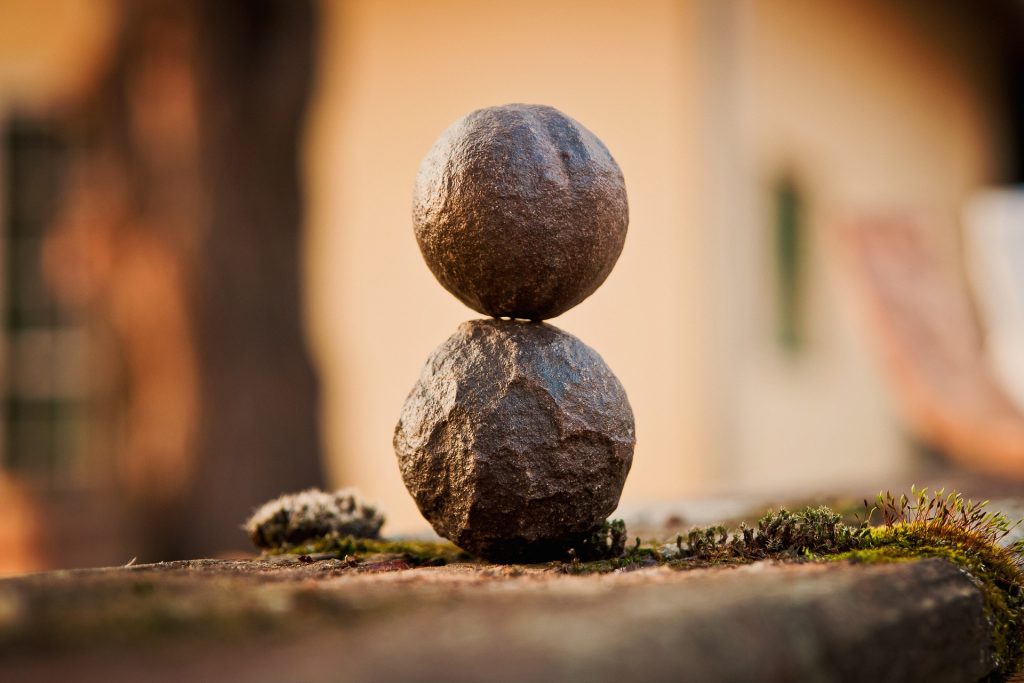
Why is Shamanism Relevant and Useful Now?
Shamanism is concerned with reigniting our nature connection. Re-discovering our place within the landscape of the earth and all of the life-forms within it. This is so relevant in today’s world where we desperately want to find that balance for ourselves, but with equal vigour, want to protect our precious environment so the earth can heal too.
Shamanism teaches us to live respectfully but to view ourselves as a part of something bigger. Part of the collective consciousness that all living beings can connect to. Shamanism is also a form of self-development. Practices give us a chance to live at peace, offering kindness and patience for the benefit of ourselves and others.
The Shamanic Journey and How it Can Help
The Shamanic Journey allows you to quiet the logical, thinking mind and access the subconscious; where our memories of living more harmoniously reside. The ego doesn’t run the show in the subconscious mind. We can access a place where we are able to work with intention and seek guidance on how to find the harmony and wholeness that is often missing from our modern life.
On a Journey, we can speak to other beings that appear to us and receive help on finding a new way to travel through life with more ease. Perhaps we are seeking answers to questions in life, perhaps we are looking for a new direction, or perhaps we are just curious. Nature is a great place to seek guidance; from the ancient wisdom of the earth that we have lost touch with as our society has developed into separateness.

Find out more and take a Journey…
Sometimes, it feels as though life doesn’t quite flow as smoothly as it could, or patterns of behaviour and experience often repeat themselves. The Shamanic Journey offers a way to gain insight into your path, your future plans and how to find balance.
The Journey is a meditation to the beat of the shamanic drum; the sound waves taking the mind to a place of relaxation and vision not usually accessible to the logical, conscious mind. Allow your logical, thinking mind to rest as your brainwaves adjust to the drumbeat and a new realm of the subconscious mind reveals itself to you.
Understand how to live with nature and all beings with more ease; flowing through life rather than resisting it. Appreciate the fullness of life and all that it has to offer when we understand our place in the universe.
Next Shamanic Journey Meditation Workshop is Friday 1st November 6 pm – 8 pm at TopLine Studio.
Autumn Renewal
As the summer draws to a close and we start to look inwards, the Autumn provides the perfect opportunity to invest in renewal; of the mind, body and spirit.
Whether you are looking for relaxation, self-care, indulgence or a total change of direction through insight, there are courses, workshops and retreats at The Well Nest this season to suit every need.
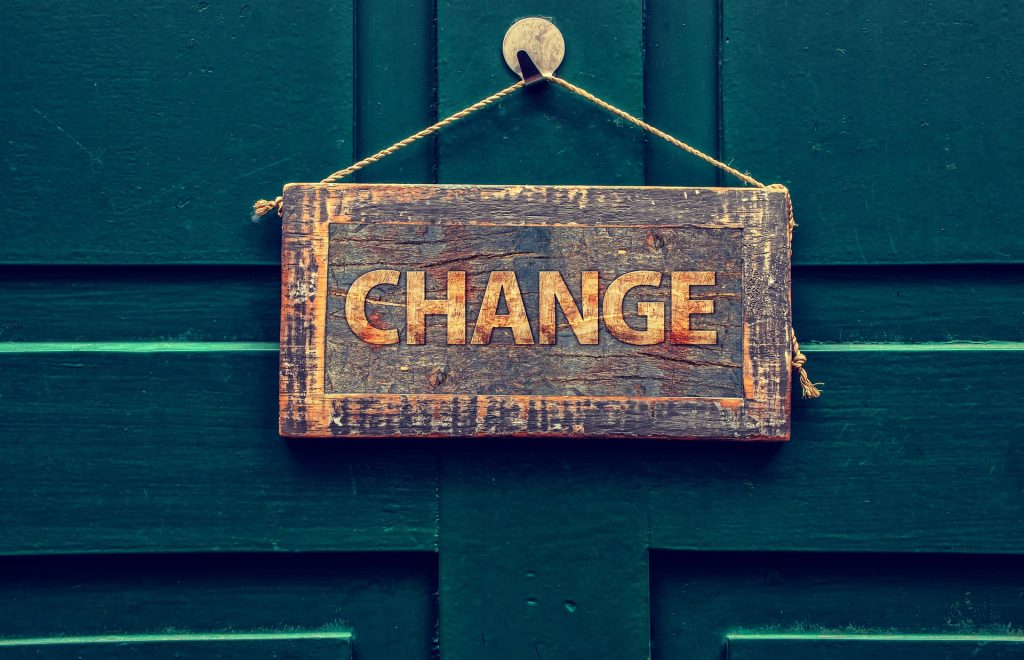
It’s important to take holistic approach to wellbeing; looking after body, mind and spirit, to ensure that a balance of overall wellbeing is achieved. At The Well Nest you will find it easier to achieve this balanced approach to wellbeing as events are all designed with a holistic approach in mind. Working on one element of wellbeing, whilst beneficial, often doesn’t address a more long-term imbalance. Make new habits and invest in you this season. It might just change your life…
What’s on this season?
All Workshops and Retreats can be booked on the Events page where you will find lots more information on each session.
September
- Yoga for Menopause – by Candlelight. Friday 6th, 7 pm – 8.30 pm, £15. TopLine Studio, Stafford. A gentle Hatha and Yin Yoga session with relaxation and meditation. Postures to help manage the symptoms of menopause and tune into the body through meditation.
- Be Kind to Your Mind – Mindfulness for Wellbeing. Tuesday 10th, 6 pm – 8 pm, Free. The University of Wolverhampton in Stafford. A public seminar exploring why and how we should practice mindfulness for better health and wellbeing. If you are interested in the 8 Session Practitioner Course (below) this seminar will give you a lot more information on that course and its benefits.
- Introduction to Mindfulness – Morning Retreat. Saturday 21st, 10 am – 12 pm, £20. TopLine Studio, Stafford. A full introduction to the practice of mindfulness that will allow you to practice at home and approach life’s challenges with a different perspective.
From the first week of September:
- Guided Meditation every Wednesday morning 8 am – 8.30 am at TopLine Studio, £5. Guided morning practice of Mindfulness and Meditation to help you establish a routine of Mindfulness. Morning is the best time to practice and where you will feel the most benefit for your day and your week.
- Yin Yang Yoga – Beginners & Improvers every Thursday morning 10 am – 11 am at TopLine Studio, £6. A gentle mid-morning practice of Hatha and Yin Yoga to help you stretch out, work on strength, balance, flexibility and joint mobility in a comfortable and supportive environment.
October
- Eight Session Mindfulness Practitioner Course. Tuesdays from 8th October, 2 pm or 6 pm, £160. The University of Wolverhampton in Stafford. A complete course to enable you to practice mindfulness fully and to provide the tools for you to change your mind and your life. The course provides an in-depth toolkit to tackle the challenges of life from work/life stress, relationships, sleeplessness, emotional and physical pain (plus more!). All course materials and refreshments provided.
- Choosing Happiness – Morning Retreat. Saturday 19th, 10 am – 12 pm, £20. TopLine Studio. A morning retreat looking at our relationship with happiness, what it means to each of us and how we can cultivate it to live freely and more joyfully.
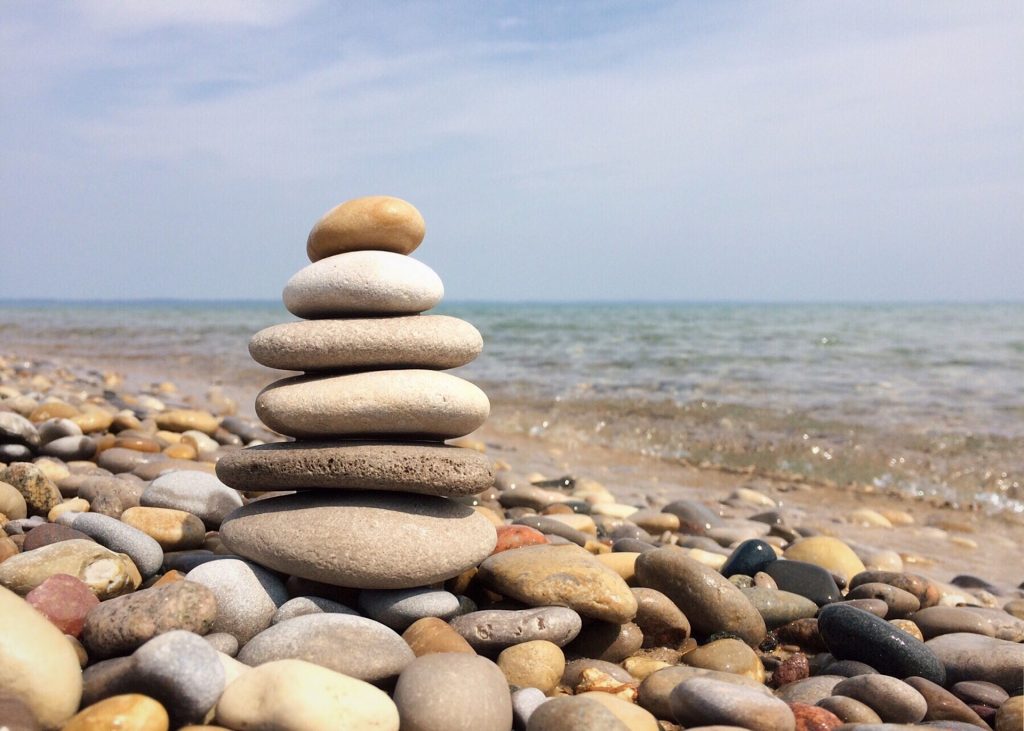
Welcome in the new season and find your balance with The Well Nest. Renew this season, for you.
Men’s Wellbeing Series
The importance of men’s wellbeing can’t be stressed enough in a time when we hear frightening statistics about mental health, and about how men in particular tend to suffer with the stresses and strains of modern life. Men are much less likely to seek help for mental health issues, workplace stress or anxiety from life in general.
The Men’s Wellbeing Series aims to provide men with an opportunity to try wellbeing activities designed specifically for men, in a community space which aims to promote sharing and openness. This is an opportunity to invest in your health and wellbeing and learn techniques to calm the mind and release stress and tension from the body. Whether you suffer with the pressures of life already, or want to get a handle on your wellbeing before your health is affected, these workshops will provide valuable tools to help you take back control of your mental and physical wellbeing.
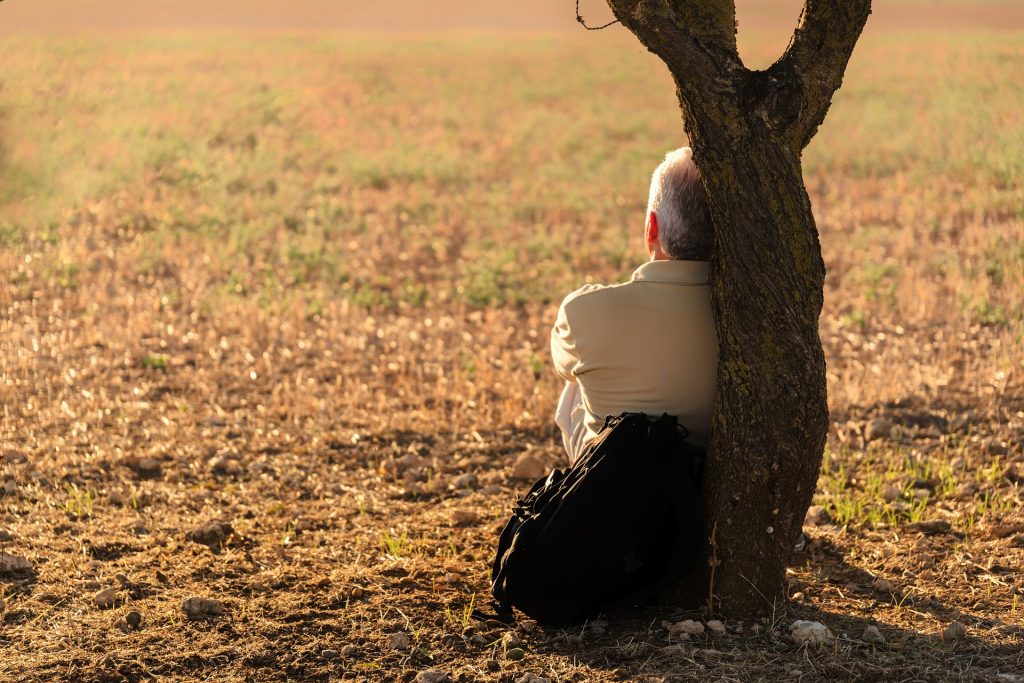
There are two options for men to try in this series, and no experience is necessary for either workshop. Each workshop can be booked individually (no need to do both) so you can choose both, or the one that appeals the most. To kickstart the Men’s Wellbeing Series, each workshop is offered at £5 off the usual investment.
The Workshops
Yoga for Mind and Body
Wednesday 26th June 2019, 6 pm – 7.30 pm, £15
A truly beneficial workshop for mind and body to help you unwind, de-stress, stretch and relax.
This workshop is a great place to start your yoga practice. The session will include dynamic movements for flexibility and strength and restorative, longer holds to encourage joint mobility and mindful movement. There will be guided relaxation and meditation included.
To find out more, or book your place – visit the Events page.
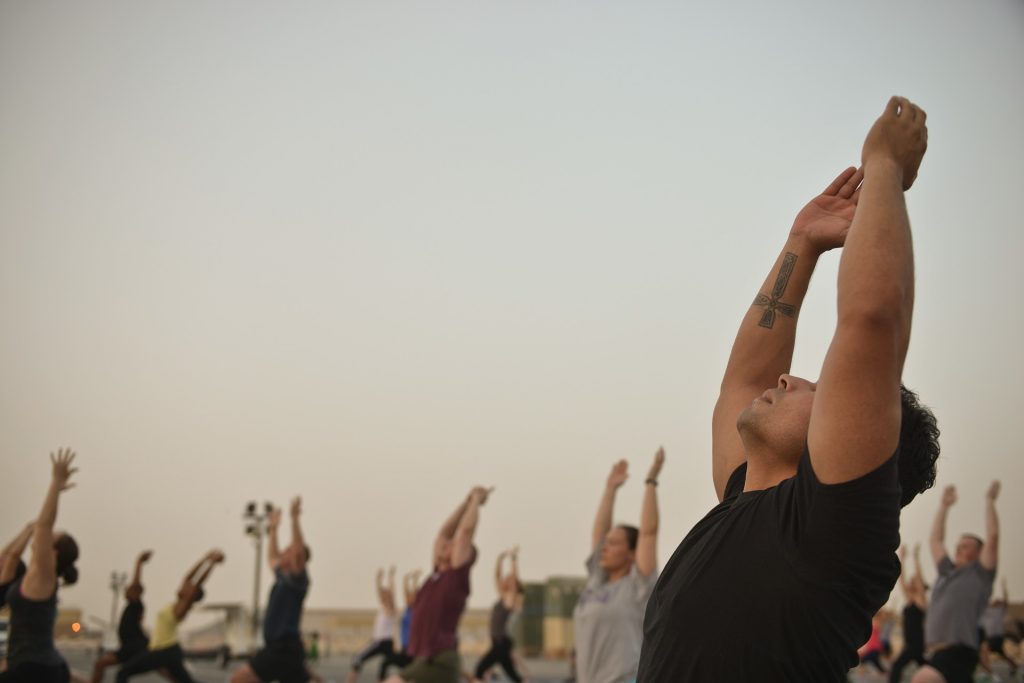
Introduction to Mindfulness
Tuesday 9th July 2019, 6 pm – 7.30 pm, £20
A fantastic introduction to mindfulness that will give you the opportunity to try practices and learn how mindfulness can help to calm the busyness of the mind.
The workshop will cover: what mindfulness is, how to connect with the present moment through awareness, using mindfulness to calm the busyness of the mind, using mindfulness in daily life and in stressful situations. Participants will try different mindfulness meditations which can be practiced during and after the session.
To find out more, or book your place – visit the Events page.
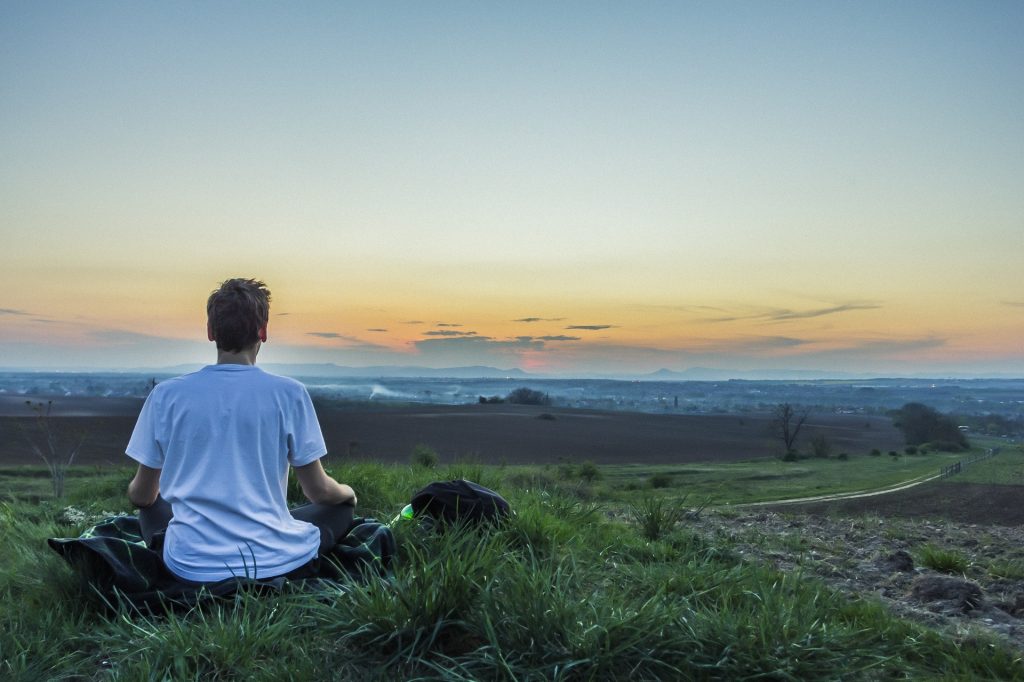
The Venue
The Workshops will be held at a great new community space above Candid Beer in Stafford town centre.
Candid is a craft beer bottleshop/taproom/coffeeshop/co-working space and events hub rolled into one. Community and conversation are central at Candid.
See you there!
New Classes and Courses for Spring
Exciting developments are on the way at The Well Nest bringing wellbeing and peace of mind to new areas in Stafford and surrounds.
A host of new classes, courses and workshops are on the way. There is something for everyone from lunchtime escapes into yoga and meditation to energetic vinyasa flow and in-depth mindfulness practitioner courses to change your mind and your life.
Wellbeing shouldn’t be the last thing we look after: if we prioritise our own inner peace, we can improve our mindset, physical and mental health, relationships and work. Don’t put it off any longer…join us and find something new.
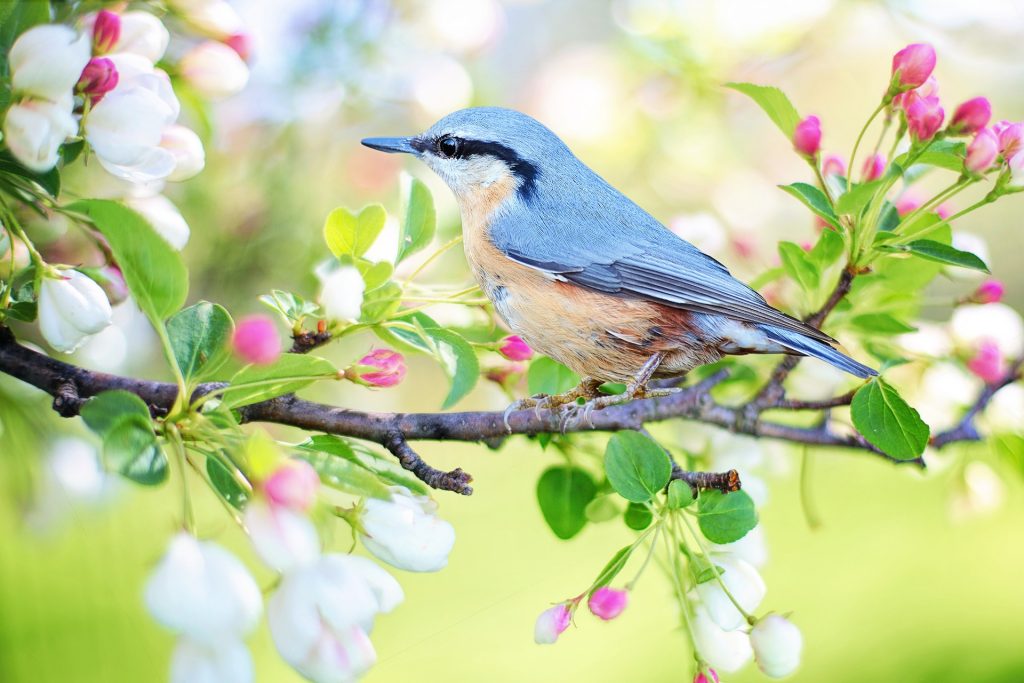
Starting in May, we have a new partnership with Staffordshire Wildlife Trust to bring yoga and mindfulness practice to the beautiful location of the Wolseley Centre. 50% of all session costs go to support the work of the Trust. The following classes and courses will be on offer:
Yin Yoga – every Friday 10 am -11.15 am in the Conference Centre. Practice this restorative form of yoga to increase joint mobility and move mindfully. classes will include relaxation and meditation. No need to book, just bring your mat to practice: £7 per session.
Mindful Walking – learn the practice of mindfulness meditation in the Gatehouse and take that outside to practice mindful walking through the wooded areas, boardwalk and lakeside at the Wolseley Centre. Sessions run one Saturday per month at £15 per person per session. Booking required.
Mindfulness Practitioner Course – 8 sessions to provide a full practice of mindfulness for everyday life. Learn how to use mindfulness to work with emotional and physical difficulties, pain, mental busyness, anxiety and stress. A full programme to change your mind and your life. The course is £160 and booking is required.
Also starting in May, the Well Nest will have regular classes and workshops at the brand new TopLine Studio in Stafford town centre. Ideally located and beautifully renovated and transformed, this space has a lot to offer for yoga and mindfulness practice.
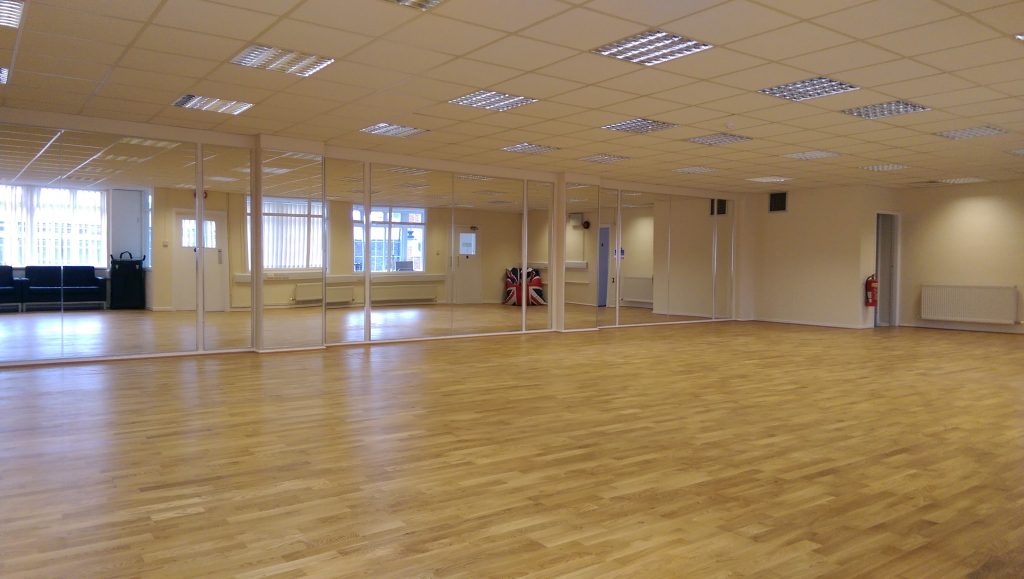
Lunchtime Escapes – taking place 4 days per week, these 45 minute sessions will offer the opportunity to either stretch and invigorate or relax and unwind in the middle of the day. Each session costs £5 and there is no need to book; drop in and leave with a different outlook.
Mondays – Yin Yang Yoga
Tuesdays & Thursdays – Meditation & Mindfulness
Fridays – Yin Yoga
Evening Yoga sessions – Finish the working day by stretching out, flowing through poses or moving mindfully with the breath. Two sessions are on offer to help you finish the day on a high. Sessions are 60 minutes long and cost £6 each.
Tuesdays 5 pm – Vinyasa Yoga
Fridays 5.30 pm – Yin Yoga
Hope to see you at one of our new classes soon! Watch this space for upcoming workshops and events.
A Mindful Christmas
The Christmas period is often a time of increased tension, stress or anxiety for many and can result in unpleasant experiences for individuals or families. Spending an extended period of time with friends and family doesn’t happen very often, so it would be beneficial for all if we were able to approach the festive season with a peaceful mind.
What causes stress at Christmas?
Mindfulness shows us that the struggles we go through in life often aren’t external to us (as we believe them to be) but are instead based in our perception and thoughts/beliefs about a situation. Most of us feel the pressure to get the right gifts for the right people, spend enough money but not too much money, make sure everyone has enough food and drink, wear the right outfit, attend the right events or parties, not drink too much,…and inevitably find time to demonstrate the right amount of merriment on social media…
A lot of the pressure we experience during the festive season can be found in our thought patterns or learned responses. Thoughts of how things should be and comparison to ideals or others can be harmful. If we tune into the present moment (no pun intended) and observe our true experience in the moment, we may find that we are able to enjoy the season more than previously. If something does go wrong – the turkey is dry, you couldn’t get that last minute gift because it had sold out – you can use mindfulness techniques to bring yourself back to the moment instead of getting caught in unhelpful negative thought patterns.

Tips to move mindfully through the festive season
A mindful queueing experience: You can’t avoid them, there are queues in shops, in supermarkets and on the roads this time of year. Every year we know it will happen the closer we get the Christmas, but every year we find ourselves frustrated, tense, irritated and sometimes infuriated with the constant waiting. Battling against the flow of life is a great source of stress for us. If we catch ourselves as frustration arises and instead of letting it take hold, we bring ourselves to our immediate experience of the moment. No judgment, no likes or dislikes, just observation. What does impatience feel like? Where is it held in the body? Try to feel it rather than think about it with the usual ‘why is this taking so long?’ ‘I should have joined the other queue’. You will notice almost straight away that tension eases out of your body and impatience gives way to patience naturally.
3 minute breathing space: When things get really testing (either during the build-up to Christmas day or during a family gathering for example) we often say things we regret or experience anger with ourselves or others. When we feel that a situation is getting too difficult, we can take 3 very effective steps to transform the moment mindfully.
- If you feel anger, impatience or frustration arising, catch it as soon as you are able and stop yourself from speaking or acting negatively. If you need to remove yourself from a situation, you can do so.
- Ground yourself in the moment by tuning into your breath. If you are agitated, try taking long slow breaths for a few minutes to give yourself space.
- Pay attention to what you are experiencing. Try to feel it in the body instead of listening to your thoughts about a situation or person. Bring your awareness back to the moment and your direct experience of it. Try to bring awareness to how a situation affects everybody, rather than just you.

Reclaim time: We always run out of time at Christmas. Not enough time to finish the shopping, wrap the gifts, visit friends and family, finish things off at work before the break. The constant rushing and pressure to ‘people please’ often leaves us more tired after the Christmas holiday than before it. This year, make a little time for yourself. The pressure we feel is often self-applied, so take a load off. It doesn’t have to be extravagant, but a little mindful self-care can go a long way. Take a walk outside and take in all that nature has to offer this season. Take a long bath with some essential oils. Read a new book. Find opportunities to bring yourself and your experience back into the present moment as often as possible instead of living in an imagined future or re-living a past event.
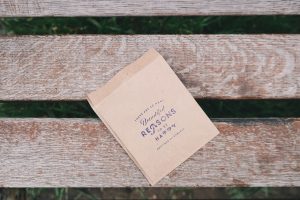
Christmas is the perfect time to practice gratitude; not just for the gifts given and received, but for all the fortunate things we experience in life that often get swamped by thoughts of how life should be or what we should have achieved ‘by now’. Take a few moments each day to list the things you are grateful for…I bet that list is much longer than your Christmas wish list.
World Mental Health Day 2018
Every day should be a mental health day, but while we have the chance for global recognition of the importance of mental health, we should take it. The World Health Organisation recognises the importance of mental health each year with a day dedicated to spreading recognition and education.
Wellbeing is an active, participant led experience. We can’t passively wait for wellbeing to improve (although time may help), instead, when we have the opportunity, we can make small changes and take small steps to improve mental health and all-round wellbeing.
What should you be doing on World Mental Health Day? You will see lots of campaigns all with different mental health themes highlighting action, education and impact studies on mental health. Here, I’d like to highlight some small things that you can do for yourself or with someone who may be experiencing mental health struggles to make a difference today.
But first…compassion

If you don’t feel ready for practical action, remember to show yourself kindness and compassion. We are good at looking after ourselves when we have the flu or a broken bone, but often berate ourselves internally when our thoughts or negative states of mind get the better of us. Mental health needs as much care and compassion as physical health. Try to reconnect with the moment through breathing meditation and allow yourself to ‘be’ rather than constantly trying to ‘do’. It’s ok to not be ok…
Try going outside
We have been lucky that the weather this WMHD is sunny and warm. Try sitting outside and taking a few moments in mindfulness. Tune into what you can hear (whether you are in the city or countryside) in the moment. Are the sounds near or far? Loud or soft? Natural or man-made? Next try noticing what you can feel – the sun on your face; breeze in your hair. Just being outside for a few moments can bring an appreciation for the beauty of life that is often lost when your mental health is affected.
Read a good book
It’s often hard to focus the mind or hold down thoughts when our mental health is suffering. Starting a simple task like reading a book can help relax the entire body and direct your thoughts into the present instead of the negative or ruminative thoughts that can occupy our minds. If you don’t enjoy reading, try mindful sketching or colouring, listening to music or playing an instrument. Even activities like baking can really bring you back to now, where your mind and body can rest.
Talk it over or write it down

Easier said than done I know, but when you are experiencing mental ill health, it’s important to maintain contact with family and friends. If you are experiencing difficulties, it’s important that you don’t try to struggle through on your own. It’s easy to stay at home alone under the duvet, but as I said at the start, wellbeing is an active process. Even a few words spoken in the gym or the shops can help you feel better. If you’re not ready to speak in person, try journalling your thoughts. Writing down your thoughts helps to rationalise them and gives context. What you may have spent all day worrying about could take on a new perspective when it’s before you in black and white. Writing or talking about how you feel helps you to let go of the grasp that we sometimes have when rumination kicks in. Turning thoughts into words can be a great release.
Gratitude
I’ve done a lot of ‘gratitude diaries’ over the years and I admit to being skeptical almost every time. However, they are a very useful activity for changing negative or unhelpful thought patterns. We can tend to get lost in our struggles or feel like we have a mountain to climb every day. If you spend a few moments throughout each day to list everything that you are grateful for, you will start to see that there are many things that can lift your mood each day: the sunlight coming through the curtains, the sound of birdsong, a good night’s sleep, an excellent cup of coffee on the way to work, the laughter of colleagues, a small kindness from a stranger, a good news story in the press, a good movie on TV, a long soak in the bath.
Pace yourself
When your mood is low or life feels like a struggle, it often seems that when you wake up in the morning, the day seems to loom over you like an insurmountable obstacle. Try to break your day up into smaller sections so you can tackle each one with more energy and a lighter mood. Try to stay focused on the immediate activities that you are doing instead of casting your mind ahead with what-ifs and rumination. Stay present and let go of the weight of the future and the past.
Be well.
Winning Ways to Wellbeing
I visited a primary school in Warwickshire recently and was pleased to see a display promoting wellbeing through 5 practical steps that are now promoted as basic steps to wellbeing all over the world. The ‘5 ways to wellbeing’ outline simple steps that we can all take to improve our wellbeing and are now advocated by the NHS in order to help people actively take control of their wellbeing. Starting small and building to a holistic approach to wellbeing can help us lessen or avoid more long-term conditions such as depression or anxiety that can effect physical and mental health for many years.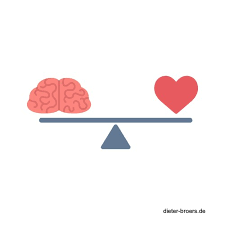
But what is wellbeing exactly? What are we trying to improve? Undoubtedly our mental health and states of mind, but wellbeing is a whole of life experience. An improvement in our overall quality of life and experience through practical, active steps to increase our levels of enjoyment, self-worth, physical and mental health and interactions with others.
This sounds like a big challenge, right? Definitely. But luckily the 5 ways to wellbeing really do work and are a great start to improving wellbeing.
The 5 Ways to Wellbeing
- Connect – There is strong evidence that being around others (friends, family, social groups) not only increases our all-round wellbeing, but also increases our longevity. Talking is the best therapy. You don’t have to share everything with others; start small. Make a meaningful connection instead of living in the digital world all the time. When you ask someone how they are, actually listen and pay attention to the answer. Speak to a stranger or make conversation while waiting in a queue. Try car sharing with a colleague; they might even become a friend.
- Be active – We have all read the decades of evidence that shows being physically active improves our mental health…so why do we still doubt it? Because it’s not easy to get active and stay active. But it’s not hard either. There are small changes we can make on the way to becoming more active and improving wellbeing. Take the stairs instead of the lift. Take a class after work with colleagues or organise a new sporting activity for all work colleagues to try. Go for a walk at lunchtime. Get off the bus a stop earlier and walk to your destination. If you feel like more of a challenge, take up a regular class that is proven to aid concentration, inner peace and help sleep…yoga is the obvious.
- Take notice – The basics of mindfulness; notice your surroundings. Be present in the moment and just ‘be’ instead of always ‘doing’. The only moment that exists is right now, so try to pay more attention to what is really going on instead of living in your head thinking about what has already happened or what might happen. Being mindful increases our awareness and knowledge of the self. If we know what we spend our time thinking about, we can start to change our thought patterns for the better. Living mindfully is a difficult task for the novice, but we can all try small steps. Choose a mindfulness cue; a sound or sight that whenever you hear/see it reminds you to take 60 seconds to be mindful and notice what’s going on in the environment.
- Keep learning – Not only is the mind kept active, but there is the chance for social interaction, being mindful and being active all rolled into one here. Continued learning can enhance self-esteem, motivation and can help you to prioritise goals and your own happiness. This doesn’t have to be a formal class to count as learning. You can try learning a new word each day, try reading the news in a foreign language, listen to classical music, join a book club.
- Give – By giving to others we develop our compassion which in turn increases our compassion for ourselves. Engaging in acts of kindness helps us to gain perspective on our own internal struggles and gain an understanding of the greater good. Giving your time, expertise or just random acts of kindness to others can greatly increase your wellbeing and decrease your attachment to seeking happiness through material gain.
A challenge…
I challenge you to try the 5 Winning Ways to Wellbeing for one week and track how you feel in body and mind. Leave a comment below about your experiences and check back to see my review of a week of Winning Ways to Wellbeing.
